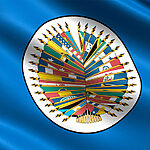The win-win of Disability Inclusion
The opportunity to work is a fundamental right that makes people independent, contributes to their professional and human development and, above all, allows them to feel like they are useful and fully contributing members of society.
This opportunity should be given to all individuals and particularly to disabled persons, who, as stated in the UN Secretary-General’s Report on Disability inclusion in the United Nations System (UN Disability Report): “shall have a full say in decision-making process and truly benefit from economic, social, political and cultural life”.
This month, we look at some of the best practices implemented by international organizations and intergovernmental institutions in order to accommodate the needs of staff members with disabilities.
We also consider how organizations that may not have specific policies or provisions in this area could make changes or accommodations to improve working conditions for staff members with disabilities.
Strengthening disability inclusion: an ideal to strive towards
People with disabilities have to overcome enough general prejudice which unfortunately is still too widespread, even in modern society, that they are somehow “other”. Employers should instead be reminded that hiring disabled persons can create a mutually beneficial relationship both in financial and social terms. For example, someone who cannot work full-time could be employed for projects that allow them to work part-time instead. In organizational terms, it could be a valuable advantage for the employer who will not have to reassign someone who is already working on a full-time basis.
This could also have a huge impact on staff morale, as disabled staff would feel appreciated, contributing to the creation and maintenance of a healthy and efficient working environment.
Leading by the example: the UN system
In our view, when it comes to existing policies, the UN system provides a standard model which other international organizations should strive to adopt in order to provide maximum protection and flexibility to staff with disabilities. The UN umbrella organizations appear to have more detailed and developed schemes and action plans with respect to disabled persons. First, they embrace the principle of non-discrimination of people with disability in the selection process, which prevents “any distinction, exclusion or restriction on the basis of disability”.
This means that, throughout a selection procedure, individuals will be assessed irrespective of their physical features, using impartial criteria that do not have the effect of systematically disadvantaging persons possessing these characteristics.
Moreover, the UN umbrella organizations go further to include people with disability into the organizational workforce, providing for a range of different opportunities and arrangements designed for disabled staff. Finally, in accordance with the UN Charter and the Convention on the Rights of Persons with Disabilities (CRPD) the organizations under the United Nations Common System (UNCS) comply with the concept of “reasonable accommodation”, meaning that they should make necessary adaptations to the workplace to accommodate the needs of disabled employees and take steps to enable people with disabilities to retain their work.
This aspect should not be underestimated, because it constitutes the legal condition to ensure the necessary flexibility in the working arrangements for people with disability, independently from the inclusion of the staff member to a Short-Term Disability program.
The UN Disability Report clarifies the steps taken by the UN system towards mainstreaming disability inclusion and, to this end, the United Nations Disability Inclusion Strategy (Strategy) explains what strategies were adopted with a view to translating these principles, values and commitments into practice.
The WHO deserves particular mention as it launched a new policy on disability on 3 December 2020. This comprises the Action Plan 2020-2023 and the WHO Diversity and Inclusion Strategy and Action Plan which will lay the foundation for the policies through which WHO aims to attract and retain a diverse workforce. Although these documents are currently still in draft form, it is worth noting that they refer extensively to the Strategy and the CRPD, adopting the notion of “reasonable accommodation” and detailing specific measures. This means that the WHO will incorporate into its internal law the same core values, indicators and standards as the UN Strategy and Action Plans.
Existing policies in other international organizations
Outside of the UNCS, other international organizations have also adopted a number of measures that make reasonable accommodations. Some examples include:
- The OSCE policy, “Official Working Hours and Flexible Working Arrangements at the OSCE Secretariat” includes staggered working hours, job sharing, part-time employments and telecommuting.
- The IAEA “Procedures Concerning Disability” is clear in establishing that a staff member who appears unable to perform their functions due to health reasons and will not recover within a reasonable period (as confirmed by a medical report), could be reassigned to different duties commensurate with their abilities, or benefit from flexible working hours.
- The Global Fund offers a range of flexible work options to be agreed between staff and management (teleworking, part-time, job sharing, etc.) and also introduced a policy in 2017 on “Facilitating Return to Work after a Long-term Medical Leave”.
- Although it does not make a specific reference to disability, the EBRD has provisions in its internal law that address working arrangements and paid and unpaid medical leave. The Directive on Organization and personnel management provides that the Bank may authorize staff members to carry out their duties in different locations or different working hours.
In order to lower the risk of discrimination against people with disabilities and maximize their inclusion, we would highly recommend all organizations to adopt a specific policy aimed at accommodating the needs of staff members with disabilities.
However, as can be seen from the examples above, this goal is also achievable through some minor changes that, without entailing any sacrifice for the employer, introduce a certain degree of flexibility into the internal legal framework, thus granting the disabled staff members the possibility to carry out their duties without any prejudice to their physical or psychological health.
One small step for an employer, a giant leap for humanity
It is clear that all international organizations should adapt their policies to the needs of people with disabilities in order to create a more egalitarian work environment.
This ultimately means adopting a legal framework that provides for some specific measures which will benefit all staff, such as flexible working hours, the possibility to work from home and/or to reassign the employee to other suitable functions, a gradual reintegration and/or adjustment of their responsibilities, and to provide them with the necessary equipment to carry out their tasks.
Likewise, staff members with disabilities and staff association should work together in other to create awareness about the needs and aspirations of people with disabilities. This could be done through many activities, including collecting and discussing these needs before reporting them to the organization, providing the opportunity for disabled people to share their experiences, ideas and information in relation to the implementation of the internal policies, and providing support and solidarity, including in legal proceedings, in case they are victims of discrimination on the basis of disability.










